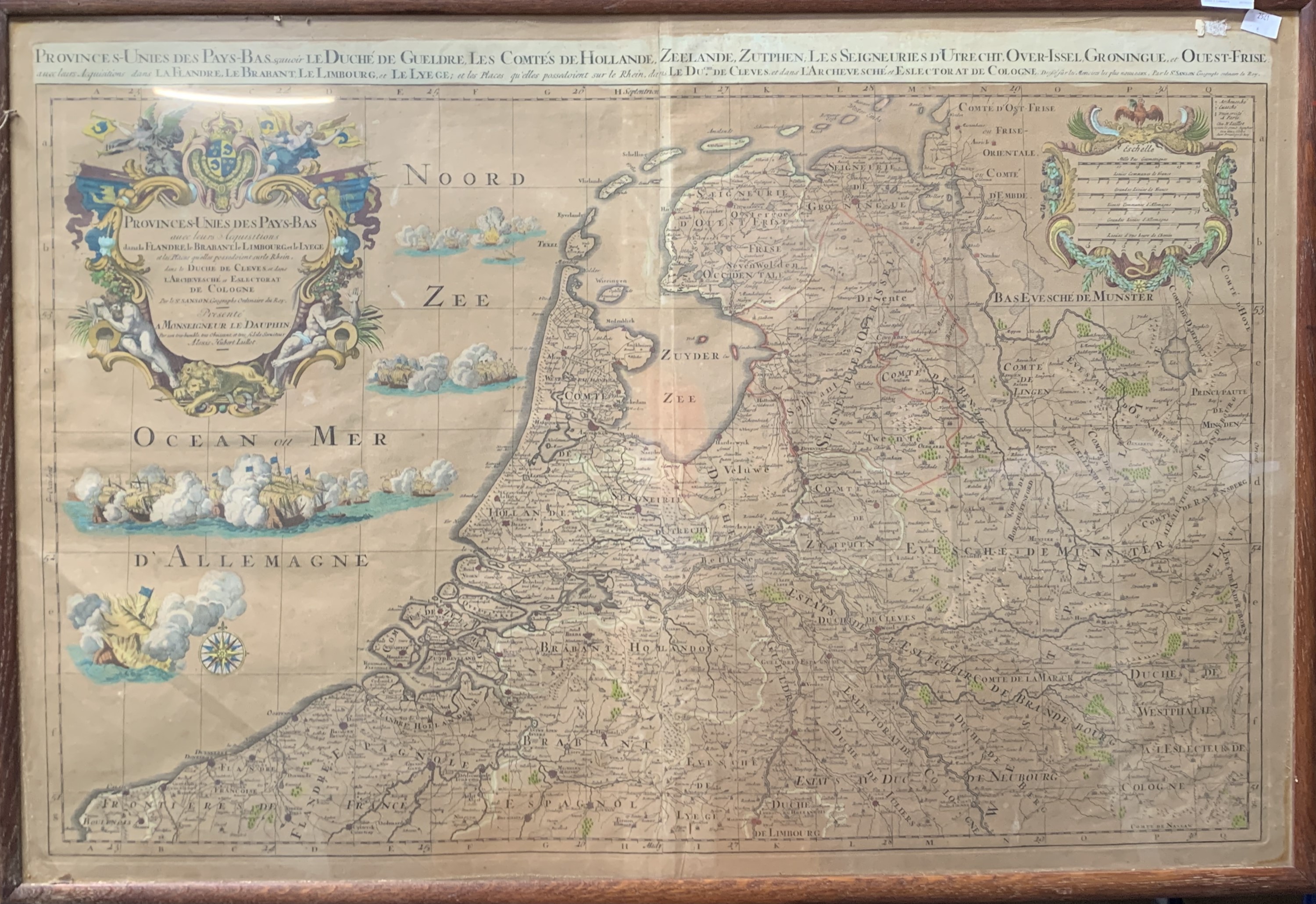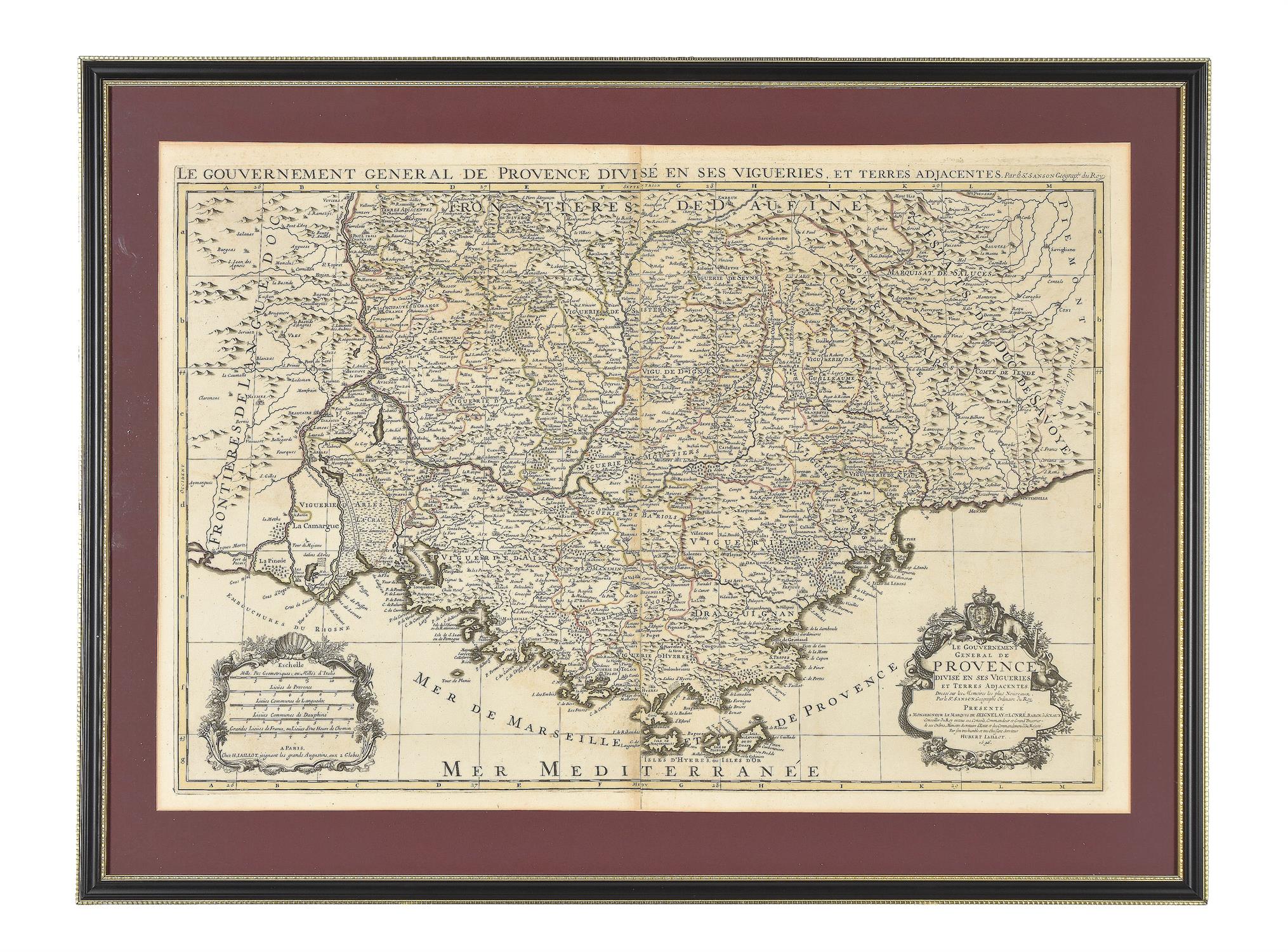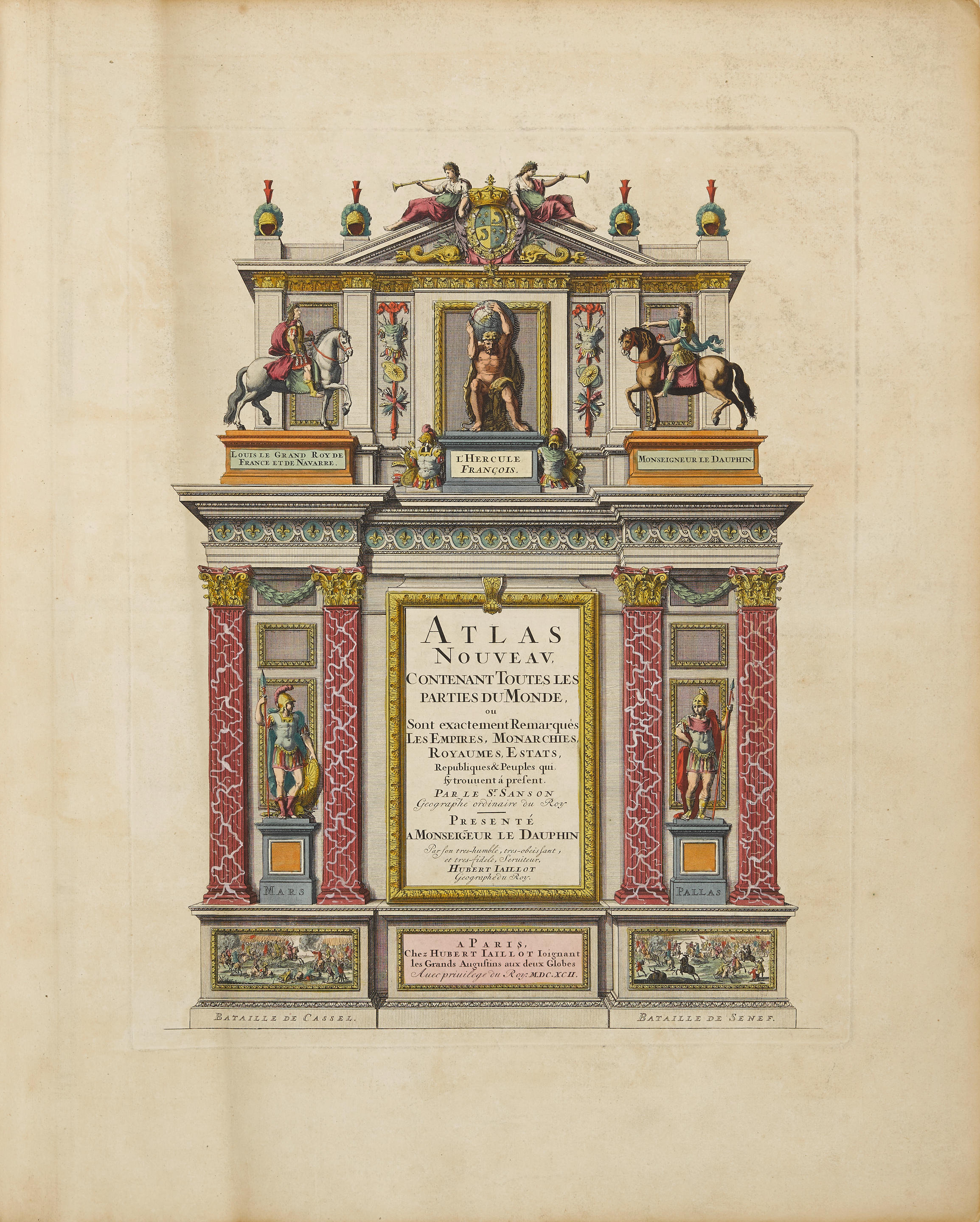Alexis Hubert Jaillot and Nicolas Sanson
Atlas nouveau, contenant toutes les parties du monde. Paris: H. Jaillot [but Amsterdam: Pieter Mortier], 1692-1696
2 volumes, folio (655 x 520mm.), engraved architectural titles, contents leaf in each volume within elaborate border (printed table pasted in center), 111 DOUBLE-PAGE HAND-COLOURED ENGRAVED MAPS (including plans of Paris and Vienna), dated between 1691 and 1696, 3 full-page fortification plans, 19 tables, 84 gazetteers (dated 1692), 28 full-page mapsheets showing 196 views and plans, title to Sanson’s Introduction à la Géographie printed in red and black, contemporary Dutch mottled calf, gilt, by the double drawer handle bindery, covers with two floral roll frames (Storm van Leeuwen III, 704), oblique armillary spheres at corners, large centrepiece of Atlas holding up the world within a leafy frame (Storm van Leeuwen III, 662), raised bands, spines gilt in compartments with armillary sphere (Storm van Leeuwen III, 810) at centre, some offsetting, binding with neat repairs
THE WARDINGTON COPY, with particularly fine hand colour, of one of the largest world atlases of the century. This example features beautifully impressed hand-coloured maps that in many cases appear to have their titles in proof state or even manuscript, apparently indicating that this was one of the earliest copies of this work produced by Amsterdam publisher Pieter Mortier. There are often faint lines visible which have been used to make the letters even, suggesting the type was just being set, or the cartouche lettering was being drawn up by a calligrapher.
In 1690, Mortier obtained from French publishers the privilege to distribute their maps and atlases in Holland. He began re-engraving maps by the French Royal Geographer Alexis Hubert Jaillot (ca. 1632-1712), the partner and successor of the “Father of French cartography,” Nicolas Sanson (1600-67). Beginning in 1669, Jaillot had re-engraved and re-published Sanson’s maps, issuing them individually and in atlases. As the world atlas passed down from Sanson to Jaillot to Mortier, it became more striking and more renowned, partly because of its augmented size, its more creative embellishments, and its higher quality paper.
The contemporary binding here is by the Double Drawer Handle Bindery, a workshop Mortier commissioned to produce bindings for some of his most important works, including his Great Bible. Jan Storm van Leeuwen suggests that Mortier may have had the “Atlas holding up the world” block tool “made especially for this project”; he records at least two other copies of the work in marbled calf bindings with this design. Given the early state of the engravings, manuscript lettering on some cartouches, lovely hand colouring, and special binding, it is possible that this copy was a prototype or exemplar used by the publisher.
REFERENCES: Pastoureau 1E and 1F; for the binding: Storm van Leeuwen, “Dutch Decorated Bookbinding” I, 245
PROVENANCE: James Gibbs (architect 1682–1754), engraved bookplate dated 1736; Christopher Henry Beaumont Pease, 2nd Baron Wardington (1924–2005), bookplate, sale in these rooms, 18 October 2005, lot 203
Alexis Hubert Jaillot and Nicolas Sanson
Atlas nouveau, contenant toutes les parties du monde. Paris: H. Jaillot [but Amsterdam: Pieter Mortier], 1692-1696
2 volumes, folio (655 x 520mm.), engraved architectural titles, contents leaf in each volume within elaborate border (printed table pasted in center), 111 DOUBLE-PAGE HAND-COLOURED ENGRAVED MAPS (including plans of Paris and Vienna), dated between 1691 and 1696, 3 full-page fortification plans, 19 tables, 84 gazetteers (dated 1692), 28 full-page mapsheets showing 196 views and plans, title to Sanson’s Introduction à la Géographie printed in red and black, contemporary Dutch mottled calf, gilt, by the double drawer handle bindery, covers with two floral roll frames (Storm van Leeuwen III, 704), oblique armillary spheres at corners, large centrepiece of Atlas holding up the world within a leafy frame (Storm van Leeuwen III, 662), raised bands, spines gilt in compartments with armillary sphere (Storm van Leeuwen III, 810) at centre, some offsetting, binding with neat repairs
THE WARDINGTON COPY, with particularly fine hand colour, of one of the largest world atlases of the century. This example features beautifully impressed hand-coloured maps that in many cases appear to have their titles in proof state or even manuscript, apparently indicating that this was one of the earliest copies of this work produced by Amsterdam publisher Pieter Mortier. There are often faint lines visible which have been used to make the letters even, suggesting the type was just being set, or the cartouche lettering was being drawn up by a calligrapher.
In 1690, Mortier obtained from French publishers the privilege to distribute their maps and atlases in Holland. He began re-engraving maps by the French Royal Geographer Alexis Hubert Jaillot (ca. 1632-1712), the partner and successor of the “Father of French cartography,” Nicolas Sanson (1600-67). Beginning in 1669, Jaillot had re-engraved and re-published Sanson’s maps, issuing them individually and in atlases. As the world atlas passed down from Sanson to Jaillot to Mortier, it became more striking and more renowned, partly because of its augmented size, its more creative embellishments, and its higher quality paper.
The contemporary binding here is by the Double Drawer Handle Bindery, a workshop Mortier commissioned to produce bindings for some of his most important works, including his Great Bible. Jan Storm van Leeuwen suggests that Mortier may have had the “Atlas holding up the world” block tool “made especially for this project”; he records at least two other copies of the work in marbled calf bindings with this design. Given the early state of the engravings, manuscript lettering on some cartouches, lovely hand colouring, and special binding, it is possible that this copy was a prototype or exemplar used by the publisher.
REFERENCES: Pastoureau 1E and 1F; for the binding: Storm van Leeuwen, “Dutch Decorated Bookbinding” I, 245
PROVENANCE: James Gibbs (architect 1682–1754), engraved bookplate dated 1736; Christopher Henry Beaumont Pease, 2nd Baron Wardington (1924–2005), bookplate, sale in these rooms, 18 October 2005, lot 203






.jpg?w=400?width=1600&quality=70)

.jpg)






Try LotSearch and its premium features for 7 days - without any costs!
Be notified automatically about new items in upcoming auctions.
Create an alert